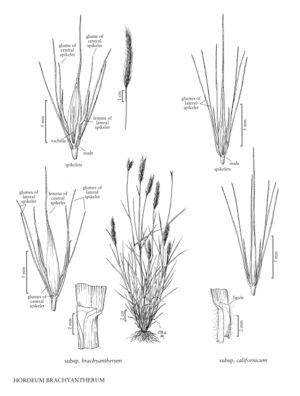Difference between revisions of "Hordeum brachyantherum subsp. californicum"
imported>Volume Importer |
imported>Volume Importer |
||
| (One intermediate revision by the same user not shown) | |||
| Line 45: | Line 45: | ||
|publication year= | |publication year= | ||
|special status=Endemic | |special status=Endemic | ||
| − | |source xml=https:// | + | |source xml=https://bitbucket.org/aafc-mbb/fna-data-curation/src/200273ad09963decb8fc72550212de541d86569d/coarse_grained_fna_xml/V24/V24_347.xml |
|subfamily=Poaceae subfam. Pooideae | |subfamily=Poaceae subfam. Pooideae | ||
|tribe=Poaceae tribe Triticeae | |tribe=Poaceae tribe Triticeae | ||
Latest revision as of 16:23, 11 May 2021
Plants loosely cespitose. Culms 20-65 cm, usually slender. Basal sheaths usually densely pubescent; blades to 11.5 cm long, to 3.5(5.5) mm wide, usually hairy with spreading hairs of mixed lengths on both sides, rarely glabrous or almost glabrous. Glumes 9-19 mm, usually spreading at maturity; lemmas usually awned, awns to 7.5 mm, usually divergent at maturity; anthers 1.1-4 mm. 2n = 14.
Discussion
Hordeum brachyantherum subsp. californicum is restricted to California. It grows on dry and moist grass slopes, in meadows and rocky stream beds, along stream margins, and around vernal pools, in oak woodlands and disturbed ground, and in serpentine, alkaline, and granitic soils, up to 2300 m. Records from outside California, and many from inside California, are based on misidentified specimens, usually of H. brachyantherum subsp. brachyantherum.
Selected References
None.
